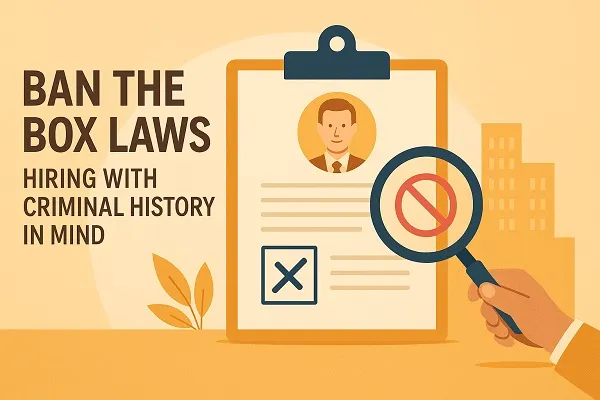Ban the Box Laws have become an essential part of modern hiring practices, especially as employers aim to create fair, inclusive workplaces. These laws focus on how businesses approach job applicants with a criminal history, ensuring they are given a fair opportunity to compete for employment. By understanding how Ban the Box regulations affect recruitment, employers can improve compliance, strengthen company culture, and access a wider pool of qualified candidates.
The Purpose Behind Ban the Box Regulations
Ban the Box Laws were developed to encourage fair hiring decisions that consider a candidate’s qualifications first, rather than their criminal past. They aim to reduce barriers for individuals reentering society after incarceration and to provide a more equitable chance at stable employment.
Employers who comply with these laws benefit in several ways:
- Access to more talent: Removing early-stage screening for criminal history allows employers to find skilled workers they might otherwise overlook.
- Improved company reputation: Fair hiring practices demonstrate social responsibility and inclusivity.
- Legal compliance: Avoiding early criminal background questions helps employers meet local and state requirements, reducing legal risk.
How Ban the Box Impacts the Hiring Process
Ban the Box Laws influence when and how employers can ask about criminal history. They typically prevent questions about convictions on job applications or during early interviews. Instead, background checks or related discussions occur later in the hiring process, often after a conditional offer.
Key Points for Employers
- Application stage: Employers must remove any questions about convictions from the job application.
- Interview stage: In many jurisdictions, employers cannot inquire about criminal records until after the first interview.
- Conditional offer: Some states require background checks only after a conditional job offer is made, giving candidates a chance to be judged on merit first.
These steps ensure applicants are evaluated fairly while still allowing employers to assess relevant information before final hiring decisions.
Understanding Employer Responsibilities

Each state or city may have its own version of Ban the Box Laws, and compliance depends on where a business operates. Employers should take the time to understand their local requirements and create standardized procedures for hiring.
Common Responsibilities Include:
- Reviewing job application forms for prohibited questions.
- Training HR and recruiting staff on compliant interview practices.
- Documenting hiring decisions to show compliance.
- Providing written notice if a job offer is rescinded based on a background check.
Employers who fail to comply can face penalties, lawsuits, or damage to their public image. Consistent procedures and recordkeeping are key to managing these responsibilities effectively.
Balancing Risk and Opportunity
Hiring individuals with a criminal history can feel complex, but with proper structure, it often brings positive outcomes. Many candidates with past convictions are eager to rebuild their lives and bring strong dedication to their work.
Considerations for Employers
- Relevance of the offense: Assess whether the conviction relates directly to the job role.
- Time since the conviction: Evaluate how much time has passed and what rehabilitation steps have been taken.
- Job safety and trust: For sensitive positions, such as those involving finances or vulnerable populations, additional scrutiny may still be necessary.
Balancing opportunity with due diligence helps organizations maintain safety while promoting fairness and inclusion.
Benefits of Hiring with Criminal History in Mind

Employers that embrace fair chance hiring practices can see measurable benefits across their organization. Fair hiring is not only a compliance issue but a strategic advantage.
Business Advantages
- Enhanced diversity: Broadening hiring practices fosters a workforce with different backgrounds and perspectives.
- Higher retention rates: Employees given a second chance often show greater loyalty and commitment.
- Stronger communities: Stable employment reduces recidivism and strengthens local economies.
- Positive brand image: Companies seen as fair and socially responsible attract both customers and talent.
When handled thoughtfully, hiring individuals with a criminal record can support both business goals and community development.
Implementing Fair Hiring Policies
Creating compliant and ethical hiring practices requires a clear process that aligns with Ban the Box Laws while supporting business needs.
Steps for Implementation
- Update application materials: Remove all criminal history questions from application forms.
- Train hiring teams: Ensure recruiters understand when and how they can discuss background information.
- Standardize assessments: Create criteria for evaluating candidates fairly and consistently.
- Document decisions: Keep thorough records of interviews, offers, and reasons for rescinding offers.
- Stay informed: Regularly review updates to local and state Ban the Box regulations.
Adopting these measures not only ensures compliance but also builds trust and transparency within the hiring process.
Common Misconceptions About Ban the Box Laws

Many employers misunderstand what these laws require or fear they prevent background checks altogether. In reality, Ban the Box Laws simply delay when that information can be used, ensuring fair consideration.
Myths vs. Facts
- Myth: Employers can’t conduct background checks.
Fact: They can, but only at the appropriate stage of hiring. - Myth: Employers must hire anyone regardless of criminal record.
Fact: Employers still have discretion to make decisions based on legitimate job-related concerns. - Myth: Compliance is too complicated.
Fact: With the right hiring policy and training, compliance becomes straightforward.
Addressing these misconceptions helps organizations confidently manage risk while staying compliant.
Why Fair Chance Hiring Strengthens Workplaces
Fair chance hiring, inspired by Ban the Box initiatives, leads to stronger, more resilient organizations. When employers focus on skills and character instead of past mistakes, they unlock new potential in their workforce.
Companies that implement fair hiring policies report:
- More engaged employees who value their opportunities.
- Reduced turnover due to higher job satisfaction.
- Better workplace morale and culture rooted in inclusion.
A balanced, fair approach to hiring not only fulfills legal obligations but also contributes to long-term business success.
Creating a Culture of Opportunity

Employers who adapt to Ban the Box Laws are not just following regulations, they are shaping a culture that values opportunity, second chances, and equality. These policies send a powerful message that a person’s past does not define their future.
By hiring with criminal history in mind, businesses show that they are willing to look deeper, invest in human potential, and contribute positively to society. When companies align their hiring practices with fairness and transparency, they don’t just comply with the law, they lead by example.
References and Key Insights on Ban the Box Laws
Several national agencies and legal organizations provide valuable research and guidance on Ban the Box Laws and fair chance hiring practices. These resources help employers stay compliant, improve hiring policies, and better understand the impact of criminal history regulations across the United States.
- According to the National Employment Law Project (NELP), 37 states and over 150 cities and counties have adopted fair chance hiring policies that remove conviction or arrest questions from initial job applications and delay background inquiries until later in the hiring process.
- The U.S. Equal Employment Opportunity Commission (EEOC) notes that using an individual’s arrest or conviction record in employment decisions may violate Title VII of the Civil Rights Act of 1964 if the policy has a disparate impact on protected groups and is not job-related or consistent with business necessity.
- EEOC guidance also recommends an individualized assessment process when evaluating applicants with criminal records. Employers are encouraged to consider the nature of the offense, the time that has passed, and how the offense relates to the responsibilities of the position.
- LawAtlas provides a comprehensive overview of state-by-state Ban the Box regulations, showing how each jurisdiction differs in coverage, timing of inquiries, and enforcement penalties.
- The U.S. Department of Labor (DOL) emphasizes that fair chance hiring and reentry employment programs help reduce recidivism, support economic growth, and strengthen communities by giving individuals with criminal histories the opportunity to achieve stable employment.
Content reviewed and published by Tier2Tek Staffing Editorial Team .

